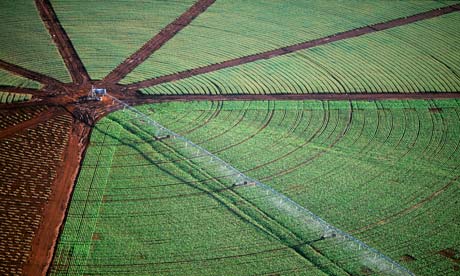
The stark differences between Brazil’s and India’s agricultural productivity and their differing positions during trade negotiations in the past years are an often used argument of why South-South cooperation will always be an elusive dream. And indeed, India has often been accused of being a nay-sayer in the realm of agriculture, even by its fellow emerging powers.
It may then come as a surprise that agriculture and food security are among the first topics that emerged when the BRIC grouping began to discuss ways to cooperate. In fact, during the first BRIC Leaders Summit in 2009 in Yekaterinburg, a separate declaration on food security was issued, underlining the importance of the matter.
In the document, the BRICs professed to be “committed to opposing protectionism, establishing a just and reasonable international trade regime for agricultural products, and giving farmers from developing countries incentives to engage in agricultural production.” The 2-page document argues that “the developed and developing countries should address the food security issue according to the principle of common but differentiated responsibility”, a concept that would become a trademark of future BRICS declarations, particularly in the field climate change. Finally, the BRICs signaled their interest in cooperating by “sharing the best practices of operating successful public distribution programmes.”
Ministers of Agriculture and Agrarian Development of the BRIC countries met for the first time in a stand-alone meeting in Moscow on March 26th 2010, a year after the first declaration on food security, and reached consensus on the following actions for agricultural cooperation under this mechanism: firstly, creation of agricultural information base system; secondly, development of a general strategy for ensuring access to food for the most vulnerable population; thirdly, reduction of negative impact of climate change on food security and adaptation of agriculture to climate change; and fourthly, enhance agricultural technology cooperation and innovation.
To implement the consensus reached at the Moscow meeting, the First Meeting of BRICS Agricultural Cooperation Working Group was held in Beijing, China in August 2011. Participants unanimously agreed to formulate the “Action Plan on Agricultural Cooperation of the BRICS countries” for the period of 2012-2016, approved at the Second Meeting of BRICS Ministers of Agriculture and Agrarian Development. Furthermore, member countries established an annual calendar of activities which will take into consideration the principles adopted at the Action Plan.
Given its expertise in the field of agriculture and food security, Brazil seems to be in a good position to assume leadership on the matter. Consequently, BRICS countries agreed that the development of a general strategy for ensuring access to food for the most vulnerable populations should be coordinated by the Brazilian government. As defined in the Action Plan, Brazil will hold seminars to exchange policies and experience of the members in ensuring food security of the most vulnerable populations; strengthen technological and industrial cooperation on livestock, fisheries, especially in the field of seawater and freshwater aquaculture, to enhance the contribution of fisheries to ensuring national food security. Furthermore, Brazil will coordinate the set-up of the BRICS group in the FAO (which happens to be led by a Brazilian). The grouping will also be within the United Nations World Food Program in order to coordinate initiatives to promote food security, projects in the area of food security and school meals, as well as incentivizing mechanisms for purchasing local food of family agriculture.
For both China and India, food security is a first-rate national security concern: With a total population of 2.5 billion, they must both dramatically increase agricultural productivity and maintain reliable food suppliers abroad. Food shortages have the potential to lead to social unrest and can undermine the governments’ legitimacy in both countries. Their interest in Brazilian knowledge about agricultural productivity is therefore vital.
But food security may not only be a tool within the BRICS grouping, but also in Africa. According to the World Bank, GDP growth originating in agriculture has proven to be, on average, two to four times more effective in raising the incomes of the poor than growth generated in non-agricultural sectors. As a consequence, Embrapa offices have opened up in several African countries. With 60% of the world’s arable land in Africa and 50% of the African population involved in agricultural production, Brazil could have a significant impact on global poverty levels.
All this, of course, does not mean that intra-BRICS competition is a thing of the past – far from it. Clashes such as the ones between Brazil and South Africa over poultry products will continue. Indeed, given the BRICS’ increasing role in global trade, they will become more frequent. The battle over resources, particularly between China and India, will be fierce over the next decades as they turn into the world’s no.1 and no.2 economies. It is yet another reason to create a platform that enhances transparency and reduces mutual ignorance between emerging powers.
After all, as The Economist recently argued,
It is easy to mock the idea of meetings for the sake of meetings. But they can create webs of mutual trust and even friendship that leaders can draw on in a crisis – and conversations over late-night drinks can do more to draw countries together than all the diplomats in the world.
Read also:
Is there potential for a BRICS security architecture?
The hidden (and nitty-gritty) world of intra-BRICS cooperation: Harmonizing statistics
Understanding intra-BRICS cooperation: The case of tax administration
Photo credit: alamay








